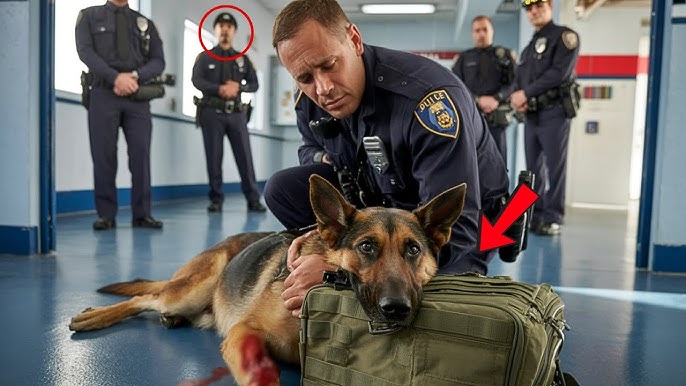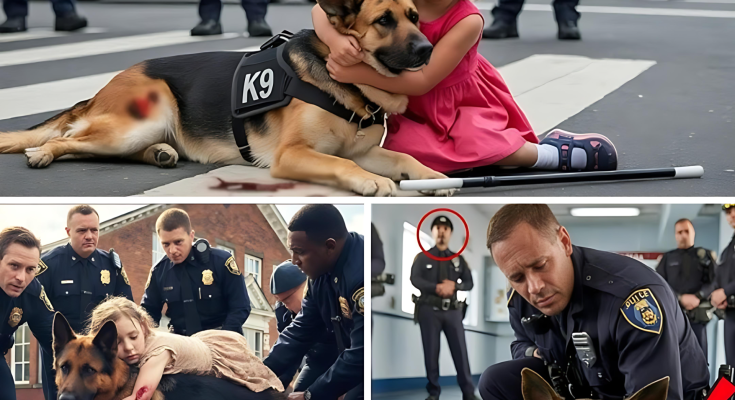The storm had passed only minutes earlier, leaving the streets slick with rain and the air heavy with the smell of wet asphalt. Water still dripped from streetlights as 7-year-old Lily Harper stepped carefully off the curb, her tiny fingers curled tightly around the leather harness of her K9 service dog, Duke.

Lily had been blind since birth. In a world made of sound, scent, and touch, Duke was her eyes—guiding her to school, to the park, and safely back home again. The big German Shepherd’s steady gait, warm presence, and constant vigilance were the anchors in her life.
That’s why the shouting caught her so completely off guard.
The Confrontation
“Hey! Stand down! Get control of that dog!”
The voices were sharp, male, and getting closer fast. Lily froze, clutching Duke’s harness tighter. She couldn’t see them, but she could hear boots splashing in shallow puddles as the footsteps closed in.
Duke stopped mid-step. His muscles tensed under his fur, tail going stiff, ears forward. He let out a low rumble—not aggressive, but protective.
Two uniformed police officers appeared out of the fading mist. “Get away from the dog!” one barked.
“He’s a service animal!” Lily’s voice wavered. “He’s helping me!”
Neither officer slowed. They moved as if the words hadn’t registered, hands hovering near their tasers.
Duke stayed between Lily and the officers, shifting just enough to keep her shielded.
Then—
The Voice

“Easy.”
It wasn’t loud, but it cut through the air like a rifle shot.
The officers froze, their attention pulled to a figure stepping out from the entrance of a small café across the street.
He was older—mid-sixties, maybe—his face weathered and lined. A limp in his left leg made each step deliberate, but there was nothing uncertain about the way he carried himself. His jacket was worn but neat, and beneath it, his chest displayed a row of military decorations, some instantly recognizable to anyone who’d served.
In his right hand, a battered cane. In his left, a paper cup of black coffee.
He walked straight toward them, unhurried, and came to stand between Lily and the officers.
The Change in Duke
Without hesitation, he reached down and placed his hand gently on Duke’s head.
The transformation was immediate. Duke’s tense frame melted, his tail relaxed, and the low rumble in his chest disappeared. He leaned slightly into the man’s touch—like a soldier recognizing an old commander.
“It’s alright, boy,” the man said softly.
Lily felt Duke’s calm seep into her own body. Her knuckles loosened on the harness.
The Clash

The older man straightened and fixed the officers with a gaze that didn’t waver.
“Care to explain,” he said evenly, “why you’re charging a child and her service dog?”
“We got a call about a dangerous animal,” one officer said, shifting his weight.
“That ‘dangerous animal’ is a registered K9 service dog trained to guide a blind handler,” the man replied. “I can smell the obedience training from here. Which means the only danger on this street right now is coming from you.”
The officers bristled. “Sir, this is police business—”
“This is my business,” the man cut in, his voice taking on a steel edge. “Because I trained this dog.”
The Revelation
Lily tilted her head toward the voice. “You… trained Duke?”
The man crouched down so his voice was level with hers. “Yes, ma’am. I was part of the Marine Corps K9 Unit. Spent twenty years training dogs like Duke for military and civilian service. He’s one of mine.”
Lily’s mouth fell open. “You made him my eyes?”
He smiled gently. “No, sweetheart. Duke already had the heart for it. I just taught him the language.”
Witnesses Gather
By now, people had begun to gather on the sidewalk. Some recorded on their phones. Others simply stared, waiting to see what would happen.
The older man—whose calm was more commanding than the officers’ authority—produced a laminated ID card from his jacket. “For the record,” he said, “I’m Sergeant Major Thomas Rourke, USMC, retired. This dog was placed with this girl through the Veterans Service K9 Program, which I helped found. He’s federally protected under the ADA. Any attempt to interfere with his duties is not just unlawful—it’s a federal offense.”
The officers shifted uneasily. The murmurs from the crowd grew louder.
The Turning Point
One of the officers muttered something about “miscommunication” and “just doing our job.”
Rourke’s eyes narrowed. “Your job is to protect. Not to intimidate a child because she’s walking with a shepherd that makes you nervous. If you had bothered to ask, you’d have seen his harness, his identification tags, and the fact that he’s guiding her instead of pulling her.”
He placed a steadying hand on Lily’s shoulder. “Now, you’re going to step back, apologize to her, and remember that not every situation is a threat just because you don’t understand it.”
The silence stretched. Then, reluctantly, both officers mumbled an apology—first to Lily, then to Rourke.
What Happened Next
As the officers retreated to their cruiser, the crowd erupted in applause. Some cheered. One woman shouted, “That’s how you stand up for people!”
A local reporter who’d been in the café rushed over to get names. Rourke politely declined an interview, saying, “This is her story, not mine.”
But the story spread anyway. Within 24 hours, cell phone footage was on every major social media platform. News anchors called it “A Masterclass in Leadership” and “A Wake-Up Call for Police Sensitivity Training.”
The police department issued a public apology and promised mandatory ADA compliance training for all officers.
A Bond Forged Twice
Later that week, Rourke visited Lily’s home. She greeted him at the door, Duke’s tail wagging like it hadn’t in years.
“Do you still train dogs?” she asked.
“Not officially,” he said. “But for you and Duke, I’ll make an exception. He’s good—but he can be even better. How about we work together?”
For the first time in days, Lily’s smile reached her voice. “Yes, please.”
The Lesson
In the weeks that followed, Rourke taught Lily and Duke new techniques—tighter turns in crowded spaces, signals for unexpected obstacles, ways to move smoothly through noisy environments. But perhaps the most important thing he taught her was how to speak up for herself, just as he had that rainy day.
And when people asked her what had happened, she always began the same way:
“I was walking with Duke… and then the man who made him my eyes appeared out of nowhere. And he didn’t just see me—he saw the truth.”
